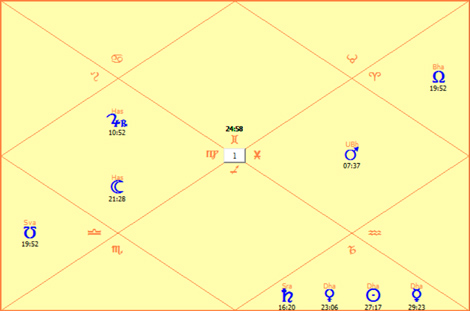Category — The Transcendental Torchlight – Kailasa Candra das
Krishna Consciousness Undermines Ecclesiology
Has the G.B.C. Now Spoiled Everything?
(Sometimes the Dragon Wins)
Part Five of a Ten-Part Series
by Kailäsa Candra däsa
“I set up the G.B.C. with hope that I shall get relief from administration of the mission, but, on the contrary, I have become the center of receiving so many complaints. So it is not a relief for me; rather, it is becoming . . . troublesome.”
Letter to T.K.G., 8-14-71
“I am glad that you have admitted about the G.B.C. members not very appropriately discharging their duty. . .We are now growing in volume all over the world, dealing with public money. . . it is time for G.B.C. members to be very, very careful, so that people may not point out any black spot in the behavior of our Society.”
Letter to T.K.G., 9-1-71
May 12, 2015 1 Comment
Krishna Consciousness Undermines Ecclesiology
Only a Radical Approach Can Be Effective
(Solving the Problem Requires First Recognizing It)
Part Four of a Ten-Part Series
by Kailäsa Candra däsa
“Lord Caitanya Mahäprabhu has forecast that this Hare Kåñëa mantra will be heard in every nook and cranny of the globe. He is God, so it will happen; that is a fact. . . if we take advantage, then we may take the credit. But if we do not, someone else will.”
Letter to Karandhära, 11-4-70
“One may make a show of devotional service like the präkåta-sahajiyäs, or one may try to support his philosophy by joining some caste or identifying himself with a certain dynasty, claiming a monopoly on spiritual advancement. Thus, with the support of family tradition, one may become a pseudo guru, or so-called spiritual master.”
Caitanya-caritämåta, Madhya, 19.160, purport
April 11, 2015 No Comments
Krishna Consciousness Undermines Ecclesiology
(The Illusion of Institutional Initiation)
Pressure From Above and Below
Part Three of a Ten-Part Series
by Kailäsa Candra däsa
“ . . . in all spheres of devotional service, freedom is the main pivot. Without freedom, there is no execution of devotional service. The freedom surrendered to the Lord does not mean that the devotee becomes dependent in every respect. To surrender unto the Lord through the transparent medium of the spiritual master is to attain complete freedom of life.
Çrémad-Bhägavatam, 1.6.37, purport
“. . . jail life is inauspicious, and free life is auspicious, but it depends on the choice whether we prefer free life or jail life. . . It is the choice of the person who is relatively concerned with either jail or freedom.”
Letter to Upendra, 7-5-69
“Whom the gods would destroy, they first make mad.”
Prometheus, “The Masque of Pandora”
February 15, 2015 3 Comments
Krishna Consciousness Undermines Ecclesiology
Return to Part One
(Exposing the Illusion of Institutional Initiation)
Ten-Part Series
Part Two: Confronting the Root Causes
by Kailäsa Candra däsa
Real philosophy and real ethics must be realized personally. The Commission and its hacks bring you their self-motivated version of philosophy, but it boils down ultimately to nothing more than institutional dogma. It is opinion, and, worse yet, it is the opinion of others that does not actually have your realization, empowerment, and happiness as its objective. It tells you that its loyal members are on the right side, and its philosophy is the right one. Both of these assertions are untrue, but they can only shape you if you let them.
Assembling a set of beliefs in order to remain in the good graces of the cult, of the Commission, of the collective, of the institution, and/or of the organized religion is to sacrifice your spiritual birthright for that which is not. “ISKCON” is nothing more than a corporate pretext used as a vehicle to fulfill the dark agenda of its power node, the discredited G.B.C. The set of beliefs espoused by “ISKCON” are mostly of the nature of dogma, and its hierarchy, in terms of spiritual advancement, is a fraud.
January 6, 2015 3 Comments
Other Considerations
(The Natal Chart of Siddhänta Sarasvaté)
Last of a Two-Part Series
by Kailäsa Candra däsa
“A sincere student should not neglect the discussion of such conclusions, considering them controversial, for such discussions strengthen the mind.”
Caitanya-caritämåta, Adi, 2.117, purport
Part Two of this series may, upon a superficial reading, be considered a bit controversial. It may spawn inimical energy directed at the person of your author. Nevertheless, as aforementioned (at the end of Part One), His Divine Grace Çréla Bhaktisiddhänta Sarasvaté Gosvämé Maharaj Prabhupäda did not shy away from controversy. He made many enemies in India, and he would have had made almost none of them if he had avoided confronting and taking action on a variety of controversial subjects. [Read more →]
November 30, 2014 1 Comment
A Natal Reading of the Sidereal Chart of His Divine Grace Śrīla Bhaktisiddhānta Sarasvatī Prabhupāda
(Along with Other Considerations)
First of a Two-Part Series
By Kailäsa Candra däsa
Lagna is Gemini, ruled by Mercury, who is combust in the eighth house. There are three major planets in quadrants, viz., the Moon is conjunct retrograde Jupiter in the fourth in Virgo, and Mars is in Pisces in the tenth. Rähu and Ketu are in the eleventh and fifth, respectively. The eighth house is loaded, as all of the rest of the planets (four) are found there. Three of them (Mercury, Venus, and Saturn) are combust. Obviously, this means that the blazing Sun is in Capricorn in the eighth.
The time adjustment indicated by our software is minus 5:43:11, as the birth took place east of London, before the world was divided into the various international zones recognized today. It took place on February 6, 1874, at 3:28 p.m. in Jagannätha Puré, Orissa, India. The ayanäàça utilized by your astrologer (for all calculations) is 20:12:23. There is controversy surrounding the ayanäàça, and this topic will be discussed in some detail, especially in Part Two. [Read more →]
November 12, 2014 1 Comment
THE NEW MEANING OF FOUNDER-ACARYA: AN “ISKCON” DOGMA OF MASS LIBERATION
Last of a Four-Part Series
A Critical Review of SPFAI
By Kailäsa Candra däsa
August 11, 2014 3 Comments
THE NEW MEANING OF FOUNDER ACARYA: AN “ISKCON” DOGMA OF MASS LIBERATION
Part Three of a Four-Part Series
A Critical Analysis of SPFAI
By Kailäsa Candra däsa
“Çré Jéva Gosvämé advises that one not accept a spiritual master in terms of hereditary or customary social and ecclesiastical conventions. One should simply try to find a genuinely qualified spiritual master for actual advancement in spiritual understanding.”
–Caitanya-caritämåta, Ädi, 1.35, purport
Prabhupäda: That means this G.B.C.’s failure. I wanted the G.B.C. They are themselves fallen, victim. Not very well carried out. This G.B.C. was meant for vigilance . . . “
-Room Conversation, 1-3-75, Bombay
“The truth is incontrovertible. Malice may attack it, ignorance may deride it, but, in the end, there it is.”
-Winston Churchill
This is a continuing review of a recent G.B.C.-sanctioned composition compiled by one of its prominent members. The title of the book analyzed here is Çréla Prabhupäda Founder-Äcärya of ISKCON (hereinafter referred to as SPFAI). As the saying goes, you can’t always judge a book by its cover–-or, for that matter, by the title on that cover. The gist of this work is that the honorific “Founder-Äcärya” (in general) and the phrase “Founder-Äcärya of ISKCON” (in particular) connotes something far more extensive than the reality of the self-evident meaning of that phrase, viz., that Çréla Prabhupäda was a Founder-Äcärya of a spiritual organization, which he called, as per its acronym, ISKCON.
July 14, 2014 1 Comment
THE NEW MEANING OF FOUNDER-ACARYA: AN “ISKCON” DOGMA OF MASS LIBERATION
Part Two of a Four-Part Series
A Critical Analysis of SPFAI
By Kailäsa Candra däsa
“Çré Jéva Gosvämé advises that one not accept a spiritual master in terms of hereditary or customary social and ecclesiastical conventions. One should simply try to find a genuinely qualified spiritual master for actual advancement in spiritual understanding.”
–Caitanya-caritämåta, Ädi, 1.35, purport
“. . . the normative guru-disciple relationship would be perpetuated within the unified institution under the direction of the G.B.C. In such an organization, many gurus would be able to act with concerted force, operating together with other leaders and managers in collegial accord.”
–SPFAI, Our Central Challenge (third sub-header)
“When logic and proportion have fallen sloppy dead,
And the White Knight is talking backwards,
And the Red Queen’s on her head . . .“
Jefferson Airplane, “White Rabbit”
This continuing review is of the latest G.B.C.-sanctioned literary composition by one of its prominent (now former) members. The title of the book being analyzed here is Çréla Prabhupäda Founder-Äcärya of ISKCON (hereinafter referred to as SPFAI). As the saying goes, you can’t always judge a book by its cover–-or, for that matter, by the title on that cover. The gist of this analysis is that the honorific “Founder-Äcärya” (in general) and the phrase “Founder-Äcärya of ISKCON” (in particular) connotes something far more extensive than the reality of the self-evident meaning of that phrase, viz., Çréla Prabhupäda as a Founder-Äcärya. [Read more →]
May 31, 2014 4 Comments
THE NEW MEANING OF FOUNDER-ACARYA: AN “ISKCON” DOGMA OF MASS LIBERATION
Part One of a Four-Part Series
A Critical Review of SPFAI
By Kailäsa Candra däsa
“Çré Jéva Gosvämé advises that one not accept a spiritual master in terms of hereditary or customary social and ecclesiastical conventions. One should simply try to find a genuinely qualified spiritual master for actual advancement in spiritual understanding.”
–Caitanya-caritämåta,
Ädi, 1.35, purport
“The spiritual master is not God. Only God is God.”
–Quest for Enlightenment, An Introduction
“One may make a show of devotional service like the präkåta-sahajiyäs, or one may try to support his philosophy by joining some caste or identifying himself with a certain dynasty, claiming a monopoly on spiritual advancement.”
–Caitanya-caritämåta, Madhya, 19.160, purport
This review is of the latest G.B.C.-sanctioned literary composition, penned by, arguably, its leading member. The title of the book in question is Srila Prabhupäda Founder-Äcärya of ISKCON (hereinafter referred to as SPFAI or SPFAI by RSA). As the saying goes, you can’t always judge a book by its cover–or, for that matter, by the title on that cover. The gist of the treatise is that the honorific “Founder-Äcärya” (in general) and the short and similar phrase “Founder-Äcärya of ISKCON” (in particular) connotes something far more extensive than has been considered for the last forty-five years, since the corporate organization came to be known as ISKCON.
April 18, 2014 2 Comments








